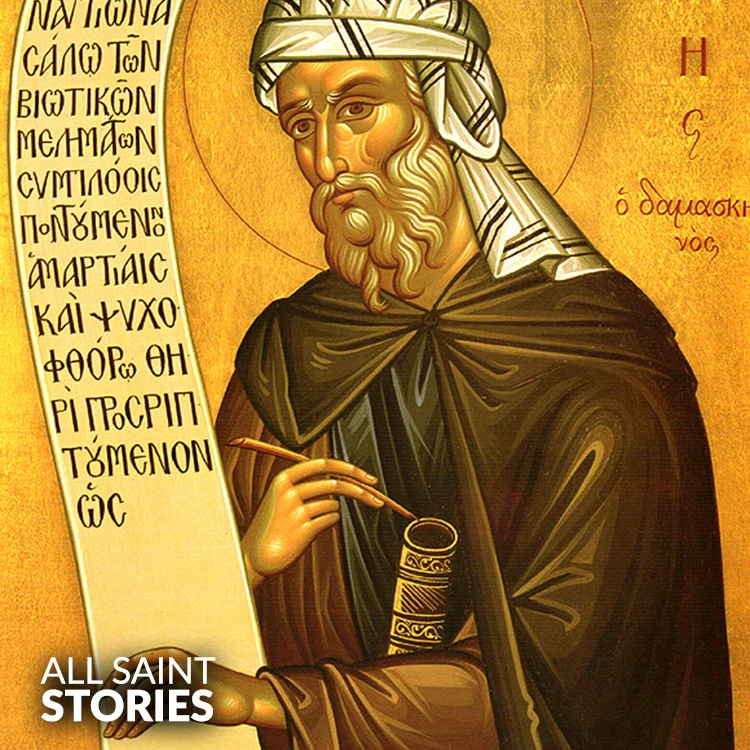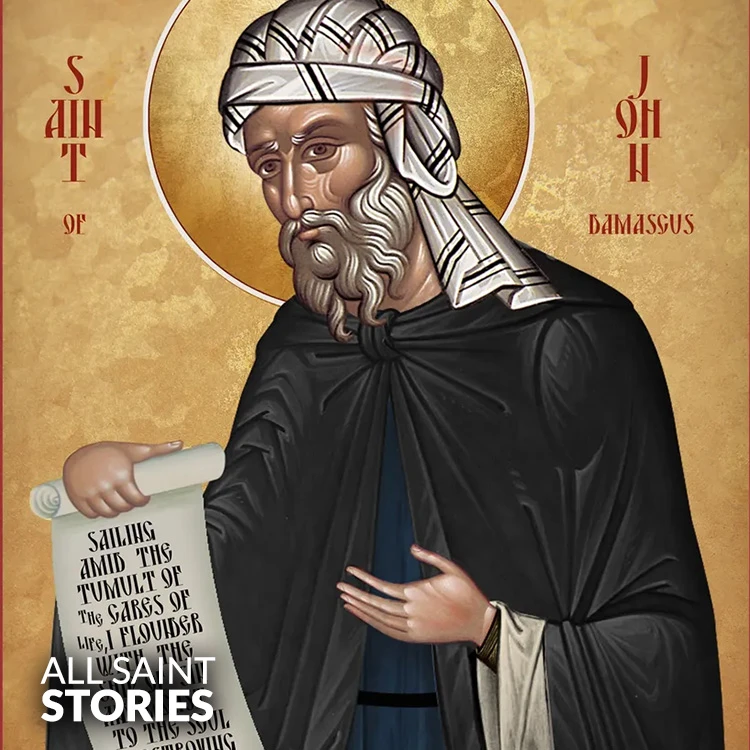O Holy St. John of Damascus, defender of the faith and lover of divine truth, grant that through your intercession, we may grow in love for Christ and boldly uphold the sacred traditions of the Church. Guide us in truth and defend us against error, that we may live as faithful servants of God. Amen.
ST. JOHN OF DAMASCUS
ST. JOHN OF DAMASCUS

St. John of Damascus (c. 675–749) was a Syrian monk, priest, theologian, and hymnographer. Known for his defense of holy icons during the Iconoclast Controversy, he wrote extensively in theology and composed hymns still used in Christian liturgy. He is venerated in both Eastern and Western churches.
St. John of Damascus, born around the year 675 in Damascus, Syria, was a distinguished Christian monk, priest, and theologian. He lived under Muslim rule during the Umayyad Caliphate, where his family held a high-ranking administrative position. Despite the Islamic dominance of the region, his family remained Christian and provided him with an excellent education in theology, philosophy, science, and the classical arts. His studies likely included exposure to both Christian and Islamic intellectual traditions, which gave him a unique theological and philosophical perspective.
John initially followed in his father’s footsteps and worked as a government official. However, he later left his administrative role and embraced monastic life, joining the Mar Saba monastery near Jerusalem. It was here that he spent most of his life in deep study, writing, and prayer. His works became foundational in the development of Eastern Orthodox theology and had a profound influence on Christian thought as a whole.
One of his most significant contributions was his staunch defense of the veneration of icons during the 8th-century Iconoclast Controversy. At a time when the Byzantine Empire, under the rule of Emperor Leo III, sought to ban the use of religious images, John wrote a series of powerful treatises titled "Apologies Against Those Who Attack the Holy Images." In these writings, he argued that since God became incarnate in Jesus Christ, it was permissible and even necessary to depict Him in art. He clarified that veneration given to icons passes on to the prototype they represent, and thus, honoring icons does not equate to idolatry. These arguments were pivotal in the eventual restoration of icons in the Eastern Church.
Another major theological work by John is his encyclopedic volume titled “The Fount of Knowledge.” This work is divided into three parts: Philosophical Chapters, Concerning Heresies, and An Exact Exposition of the Orthodox Faith. The last part, in particular, became one of the first comprehensive summaries of Christian theology and is still used as a reference in Eastern Orthodox education. In it, John synthesizes the teachings of the Church Fathers and presents a systematic outline of Christian doctrine, covering topics like the Trinity, Christology, and the sacraments.
In addition to his theological and apologetic writings, John of Damascus was a prolific hymnographer. His liturgical hymns, especially those written for Easter such as the Canon of Pascha, remain an integral part of the Orthodox liturgical tradition. His poetic and theological brilliance helped shape the tone and theological depth of Byzantine hymnography.
John’s influence extended far beyond his lifetime. He is considered the last of the Greek Church Fathers and one of the first Christian thinkers to engage deeply with the early Islamic world. Despite not being formally canonized in the modern sense, he has been venerated as a saint by both the Eastern Orthodox and Roman Catholic Churches. The Roman Catholic Church later declared him a Doctor of the Church in recognition of his theological significance.
His feast day is celebrated on December 4. His relics are preserved at the Mar Saba monastery, where he spent most of his monastic life. His enduring legacy lies not only in his theological writings and hymns but also in his unwavering commitment to the defense of the faith during a time of great controversy and upheaval in the Church.
Video Not Found
The information on this website is compiled from various trusted sources. While we aim for accuracy, some details may be incomplete or contain discrepancies.
If you notice any errors or have additional information about this saint, please use the form on the left to share your suggestions. Your input helps us improve and maintain reliable content for everyone.
All submissions are reviewed carefully, and your personal details will remain confidential. Thank you for contributing to the accuracy and value of this resource.
Credits & Acknowledgments
- Anudina Visudhar (Malayalam) – Life of Saints for Everyday
by Msgr. Thomas Moothedan, M.A., D.D. - Saint Companions for Each Day
by A. J. M. Mausolfe & J. K. Mausolfe - US Catholic (Faith in Real Life) – Informational articles
- Wikipedia – General reference content and images
- Anastpaul.com – Saint images and reflections
- Pravachaka Sabdam (Malayalam) – Saint-related content and insights
We sincerely thank these authors and platforms for their valuable contributions. If we have unintentionally missed any attribution, please notify us, and we will make the correction promptly.
If you have any suggestion about ST. JOHN OF DAMASCUS
Your suggestion will help improve the information about this saint. Your details will not be disclosed anywhere.
© 2025 Copyright @ www.allsaintstories.com


 English
English
 Italian
Italian
 French
French
 Spanish
Spanish
 Malayalam
Malayalam
 Russian
Russian
 Korean
Korean
 Sinhala
Sinhala
 Japanese
Japanese
 Arabic
Arabic
 Portuguese
Portuguese
 Bantu
Bantu
 Greek
Greek
 German
German
 Dutch
Dutch
 Filipino
Filipino